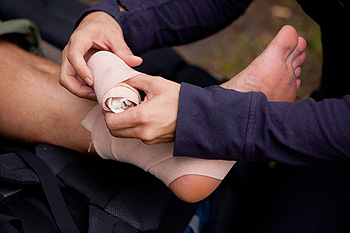Types of Ankle Sprains
Monday, 15 February 2021 00:00 Ankle sprains occur when the ligaments that connect the bones in the ankle become stretched or torn. Ankle sprains are divided into 3 categories. A Grade 1 sprain occurs when the ligament is mildly stretched. Once a ligament is slightly torn, a Grade 2 sprain occurs. A Grade 3 ankle sprain is the complete tear of one of the ligaments in the ankle. Sprains are usually indicated by pain, tenderness, bruising, stiffness, and an inability to put weight on the affected ankle. Upon experiencing a possible ankle sprain, it is important to visit with a podiatrist. A podiatrist will take X-rays to make sure there isn’t a fracture, and they will also determine the severity of the sprain. After the injury is assessed, your podiatrist will suggest the proper treatment options.
Ankle sprains occur when the ligaments that connect the bones in the ankle become stretched or torn. Ankle sprains are divided into 3 categories. A Grade 1 sprain occurs when the ligament is mildly stretched. Once a ligament is slightly torn, a Grade 2 sprain occurs. A Grade 3 ankle sprain is the complete tear of one of the ligaments in the ankle. Sprains are usually indicated by pain, tenderness, bruising, stiffness, and an inability to put weight on the affected ankle. Upon experiencing a possible ankle sprain, it is important to visit with a podiatrist. A podiatrist will take X-rays to make sure there isn’t a fracture, and they will also determine the severity of the sprain. After the injury is assessed, your podiatrist will suggest the proper treatment options.
Although ankle sprains are common, they aren’t always minor injuries. If you need your ankle injury looked at, contact one of our podiatrists from Coastal Foot & Ankle Wellness Center, LLC. Our doctors can provide the care you need to keep you pain-free and on your feet.
How Does an Ankle Sprain Occur?
Ankle sprains are the result of a tear in the ligaments within the ankle. These injuries may happen when you make a rapid shifting movement while your foot is planted. A less common way to sprain your ankle is when your ankle rolls inward while your foot turns outward.
What Are the Symptoms?
- Pain at the sight of the tear
- Bruising/Swelling
- Ankle area is tender to touch
- In severe cases, may hear/feel something tear
- Skin discoloration
Preventing a Sprain
- Wearing appropriate shoes for the occasion
- Stretching before exercises and sports
- Knowing your limits
Treatment of a Sprain
In many cases, the RICE method (Rest, Ice, Compression, and Elevate) is used to treat ankle sprains. However, you should see a podiatrist to see which treatment option would work best with your injury. In severe cases, surgery may be required.
It is important to ask your doctor about rehab options after you receive treatment for your injury. Stretching, strength training, and balance exercises may help the ankle heal while also preventing further injury.
If you have any questions, please feel free to contact one of our offices located in St. Augustine, and Palatka, FL . We offer the newest diagnostic and treatment technologies for all your foot care needs.







